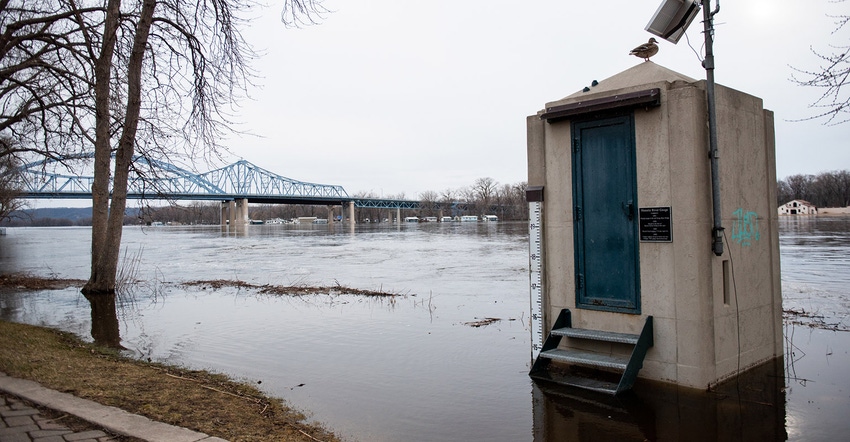
Farmers south of St. Louis expecting to load up on spring-applied fertilizer should have few hiccups to worry about as they prepare for planting.
The story is not quite as clear further north.
“The whole Mississippi River system is delayed,” says Joe Dillier, director of plant food at Growmark. “South of St. Louis it is operating, but there’s a lot of restrictions. Tows and operating hours are reduced. Getting supplies to the Quad cities or further north could be a month late. It has the potential to have the biggest impact on nitrogen, especially urea and some UAN as well.”
Those delays could be made worse by more flooding this week as another big storm is expected to impact the Midwest.
The weather-driven delays could not come at a worse time for farmers, many of whom were expecting to plant more corn acres and were unable to apply fertilizer last fall due to the weather-delayed harvest.
“We typically have imports of fertilizer coming in, in spring, urea and some phosphate, some potash, and all of the vessels that are trying to come in have had bigger delays than I’ve ever seen,” says Dillier.
High waters and consistently fast currents are causing delays down in the Gulf. But it’s the upper Mississippi north of St. Louis that may have the biggest trouble related to fertilizer supplies. Dillier says the locks and dams in and around Quincy, IL, and Canton, MO may not re-open before the second half of April.
“We’re not sure if current estimates are going to work out but all the water, snow melt and rain we’ve had have caused locks to close and you can’t get fertilizer supplies that would normally come off the river,” he says.
The Mississippi is a massive cog in the fertilizer supply chain because it’s far more economical to move supplies by barge. Although nitrogen-production capacity has grown in the western corn belt in recent years, it’s still common for spring fertilizer supplies to come north on Mississippi and Illinois river barges.
If delays continue farmers may have to switch nitrogen forms or go to more side dress or mid-season UAN or ammonia, a growing trend in recent years. If all else fails they may grow more soybeans than expected.
In northern Iowa Shelly Kruse, general manager at AgVantage FS, says the company is well stocked with extra dry fertilizer; they don’t rely on barge for anhydrous supplies which mainly come in through truck or pipeline.
“We could run into challenges but at this point I don’t hear anyone switching acres – it might be minimal,” she says. “We have pretty good storage particularly on dry fertilizer. On anhydrous it could get dicey, but anhydrous is so much pipeline fed that we don’t rely on that barge. The ones that will be impacted most will be in Illinois because they do rely more on barge anhydrous.”
More rains could keep locks closed, which could push nitrogen prices higher for affected areas.
“My best advice is to keep communicating with retailers and make sure everyone understands the supply situation,” says Dillier.
On a positive note, new and larger planters can move fast when weather clears. Last spring much of the Midwest was delayed until around May 10 when soils finally dried enough to hit the fields. Planting progress across the corn belt jumped from 25% to 65% in one week.
“If the river gets delayed then planting gets delayed, but when planting gets started it goes fast with this big equipment,” says Dillier.
“This year, with the wrinkles in supply chain and potential need for more nitrogen this spring, we don’t want any more complications that it looks like we have already.”
About the Author(s)
You May Also Like






